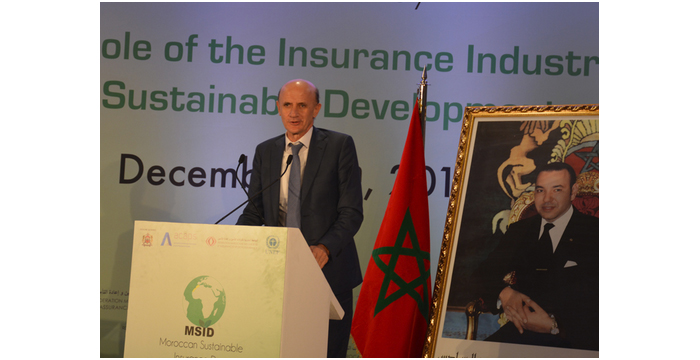Mr. Zouheir CHORFI, Secretary General of the Ministry of Economy and Finance, gave, on behalf of the Minister, the opening speech of the 1st Moroccan Sustainable Insurance Day 2017 held on Wednesday, December 6th 2017 in Rabat.
This conference, devoted to sustainable insurance, was organized by the Insurance Supervisory Authority and Social Welfare (ACAPS) in collaboration with the Moroccan Federation of Insurance and Reinsurance Companies (FMSAR) and the United Nations Program for the Environment (UNEF), under the theme "the role of the insurance industry in sustainable development".
During his speech, the Secretary General recalled the commitments of the financial sector in the roadmap aimed at bringing the Moroccan financial sector into line with sustainable development.
He thus focused on the major challenge that climate change constitutes for sustainable development and its strong link with the increase in natural disasters across the continent, with the risk of the impoverishment of the populations especially among vulnerable and needy groups.
In this respect, he recalled that Morocco adopted in 2016 a law establishing a catastrophic risk coverage system including a mixed compensation scheme for victims, linking both a benefit system provided by the Solidarity Fund against Catastrophic Events for the benefit of individuals without coverage, and an insurance system for the benefit of persons that hold an insurance policy covering bodily injury and insured property.
The Secretary General stressed that the Ministry, with the involvement of the (ACAPS), is actively working for a speedy entry into force of this law, which is based not only on the adoption of regulations but also and more importantly on the implementation of the institutional scheme of the effectiveness of the device, the disasters assessment system and compensation management and, most importantly, on a financing approach that ensures the sustainability of the entire system.
Indeed, the objective is to be sure that once the implementing texts have been adopted, the insurance companies and the Solidarity Fund against Catastrophic Events will be able to rapidly compensate the victims of catastrophic events.
It is within this framework that the Secretary General invited the (ACAPS) and the (FMSAR) to assist insurance companies to set up the necessary management tools, including information systems and assessment and disasters management measures, with the aim of a quick and successful launch of this major project.

In this regard, the Secretary General stated that once this system adopted, the implementing legislation, which will set the rates, the deductibles and the ceilings of this new guarantee against catastrophic risks, will be involved in the adoption system thus acting as an effective entry into force of this law.
In addition to climate change, the Secretary General recalled that other issues of sustainable development also need a greater involvement of the insurance sector and a diversified and appropriate product offer.
He pointed, in this respect, to micro-insurance which is a form of insurance distribution for reaching the poorest classes who are most vulnerable to the risks.
Finally, the Secretary General referred to health and the sustainability of revenues. The latter are other issues of sustainable development for which the insurance sector will have to play a greater role, particularly through the supply of more appropriate insurance products. It will, therefore, enable the support of public policies in this area, namely compulsory health insurance and pension schemes, especially with the phenomenon of increasing the life expectancy of the population and its corollary in terms of the sustainability of these schemes.